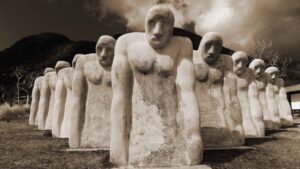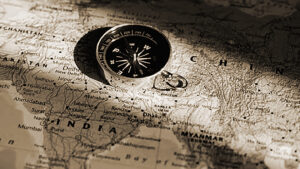
CULTURE DIARIES By Vidyarthy Chatterjee
“God is the only being who, in order to reign, doesn’t even need to exist.”
– Charles Baudelaire
It is with these words that the renowned filmmaker Emir Kusturica’s ninety-minute documentary on the one and only Maradona begins. Kusturica’s film, structured like a ‘musical’, does more than what a hundred newspaper articles cannot, to illustrate the tempestuous, tragic and triumphant life and career of the iconic figure recently described by the football expert Luca Caioli as ‘the greatest footballer of all time who could destroy any opposition all by himself’.
Mixing interviews, home-movie clips, excerpts from prize-winning feature films, animations and archival footage with the touch of an inspired maestro, which of course he is, Kusturica proves why in his heyday he was counted among the great filmmakers of the world.
Truly, the film is one master’s heartfelt tribute to another – one working with the camera and his own musical rock band to match it, the other kicking the shit out of his opponents for as long as he toyed with the piece of inflatable leather and even long after he had retired from the game.
Luca Caioli has reported and written on football for newspapers, radio and TV across Europe for more than twenty five years. His bio-data includes biographies he has written of two of the stars of contemporary international football – Lionel Messi and Neymar Jr.
In justification of his assessment of Maradona as the world’s greatest footballer ever, Caioli is on record: “Maradona would single-handedly change the course of a game with his supreme skill and talent. Yes, there were the legendary Pele and Henrik Johannes Cruijff before him, but Maradona was truly a class apart in terms of destroying the opposition. Don’t forget that he played for a relatively lesser known team like Napoli and he was able to lift it to great heights – that is greatness.”
The views of football experts, however experienced, knowledgeable and perceptive they may be, are commonly not placed at par with the opinion of those who have played the game at the highest competitive levels for at least some period of time. And it is here that the views of someone like Jorge Valdano attain a singular significance.
Between them, Valdano and Maradona humbled Germany 3-2 in the 1986 World Cup final. Thanks to the efforts of Maradona in particular, Argentina could consider themselves worthy champions. Valdano is a great fan of Pele and Garrincha, the latter perhaps the most deeply loved of all Brazilian footballers, but it is for Maradona that he has the highest praise.
Speaking years after his retirement, Valdano reminisced that players like Garrincha, Pele and Maradona had the ability to cut themselves off from their surroundings completely and concentrate solely on the game; in a sense, they were returning to their childhood. But it was different with Cruijff, who was also a world-class footballer but always behaved like an adult on the pitch.
Even as a player, the Dutchman seemed to be considering everything – the result, whether he was playing at home or away, if the match was going to be shown on television, etc.
While the others were great footballers and at least one of them, namely Garrincha, a great human being as well, it was Maradona who represented a complete universe, characterised by the attainment through struggle and application of the highest of summits; a flawed destiny outside the playfield; and a prolonged grappling with a serious drug habit which he was, mercifully, able to defeat in the end.
Kusturica’s documentary takes on a moving confessional edge as Maradona admits to having been an ‘asshole’ and missing out on sharing with his wife, Claudia, the beautiful years when their daughters, Dalma and Giannina, were growing up because he was then either in police custody or in rehab.
Maradona consoles himself thus: “If Jesus stumbled, why shouldn’t I?” The great man is quick to add: “I made a mistake, I paid for it.” And then he shows his love for the game and for all those who love it, when he says: “If someone makes a mistake, football should not pay for it.”
Kusturica would be the first to agree with Valdano when he says: “Diego made mistakes off the pitch, but he must be judged by his achievements on it. Maradona is the embodiment of the Argentinian dream. He played like a mischievous boy and tried to make fools of everyone. With the ball at his feet, he was a magician. Every Argentinian would like to play like Maradona. Even the celebrated Alfredo di Stefano, who was a top footballer himself.”
What is it about Maradona that so many years after having left playing, he still excites the popular imagination in a way that cannot be said of any other sportsman in the world? Wherever the short, stoutly-built, muscular man with the baby face and winsome smile, and tattoos of Fidel and Che on his thigh and on his arm goes, he has a swift look around the place and its people, and leaves it immediately after conquering it. Vini, Vidi, Vici! The Argentine Caeser of international football did that in Calcutta in 2008, and did it all over again sometime later in Cochin.
They say that there are remote corners on this planet where people have not heard of Christ, but start dancing at the mention of Maradona. It could be just a story cooked up by an excessively proud and imaginative Argentinian, but the point is made!
Talking of Christ, Kusturica shows us in some detail, in a mock-serious fashion, the existence in Argentina of a Church complete with footballesque rituals and ceremonies dedicated to Maradona whose members are prepared to lay down their lives for him. The sacred, tongue-in-cheek message seems to run like this – if God cannot be brought down from heaven, then he will have to be invented on terra firma.
The Bosnia-born, Paris-based director of such small modern classics like Do You Know Dolly Bell? (Golden Lion of St. Mark at Venice, 1982) or When Father Was Away On Business (Golden Palm, Cannes, 1984), devotes considerable footage showing the Church congregation singing praises to the icon who rose from the humblest of beginnings to heights frequented by monarchs and heads of state for most of whom, however, he has the scantest regard.
Maradona, born to a proud member of the labouring class and his patient wife who laboured no less on the homefront, is one of many brothers and sisters. His parents, however hard they struggled, had a difficult time putting enough food on the table for their many growing children.
Visiting the humble home where he grew up dreaming of playing the World Cup and winning it for Argentina, Maradona is shown remembering the time when his mother would feign sudden attacks of stomach pain and leave the dining table without eating. Years later, Maradona realised that his mother did it so that he and his siblings could have a little more to eat – her share.
Living in the suffocating ‘lower depths’ of the big, cruel city and struggling all the while to give shape to his idea of becoming a celebrated footballer, Maradona fashioned at an early age his own politics of the ‘aristocracy of the poor’. Boca Juniors, the Buenos Aires football club, offered him less money than other wealthier teams, but Maradona chose Boca because he was more interested in things other than money; and, in any case, he wanted to keep his promise to his father that he would play for Boca.
He also promised to his father that he would play in the World Cup and bring the trophy to Argentina. Kusturica says, this is what separates Maradona from the rest; this disinterest in symbols of worldly success.
In later years, Maradona was to give further proof of the rare, regal stuff he was made of. By his own account, the US wanted to give him an award but he declined not only because he thought Bush was a ‘war criminal’, but because at about the same time the Cubans had decided to decorate him with a national honour. Kusturica says he thinks if Maradona had not been a footballer, he would have been a swashbuckling revolutionary, smelling of gunpowder and the Mexican Revolution and of a bordello out of which he had just emerged.
In a no-holds-barred narration laced with irony and laden with telling comments, the Bosnian director makes the audience ripple with delight when he isn’t engaged in causing eruptions of laughter. There is ribaldry in the narration, also a sense of pure and innocent fun, and finally, great sadness at the spectacle of a great soul defeated, but only temporarily, by his ‘doing everything to his own detriment’.
There are some innocents who think that sports and politics don’t mix. But we all know that ground realities tell a different story. All his adult life, Maradona has consciously and deliberately committed one act of sabotage after another to prove that sports is actually little sports and much politics.
He flatly refused to shake hands with Prince Charles of England because he thought those hands were stained with the blood of Argentine victims summarily executed by the British army in the aftermath of the Malvinas (Falklands) war of 1982. The contempt extended to Maggie Thatcher, the then British Premier, and the Queen of England.
This friend of Castro, Chavez, Evo Morales and the poorest of the poor of Argentina and the rest of Latin America, did what he did because that is all he could do to avenge the brutalities perpetrated by England and her protector, the United States. “We were representing our dead in the Malvinas war, so we had to defeat on the playfield one of the rulers of the world,” Maradona is heard telling Kusturica, who uses some hilarious animation sequences in his film showing the footballer settling scores with the likes of Reagan, Bush, Blair, Thatcher, the Queen and her son.
Maradona’s unqualified admiration for Castro is another compelling facet of the enormous folklore that has steadily grown around the footballer. Referring to a 1987 meeting with the Cuban President, Maradona tells Kusturica, “Fidel looked like a beast defending his territory against the US… he has b****… I can die for Fidel… reading Che and staying in Cuba were major influences for me… having the most powerful bomb doesn’t make you powerful.”
Meanwhile, Maradona’s aversion to active participation in politics stems from his belief that ‘politicians rob the people’; these people’s enemies are almost always hands-in-glove with mafia elements.
However, the mafiosi whose activities he knows best belong to the FIFA, the immeasurably rich and powerful organisation controlling world football. Maradona: “Let us talk about the twenty years when Havelange(of Brazil) was the head of FIFA. He used his immense power in a way where we can say that if Havelange was the mafia arms dealer, Blatter sold the bullets.”
If Kusturica’s statement that Maradona was ‘his own worst enemy’ in the days he was hooked on cocaine is true, it is equally true that he has been his best cleanser as well. Big tears roll down his corpulent cheeks as he narrates his sufferings whilst trying desperately to distance himself from his drug habit. Only after he had given it up and redeemed himself above all in his own eyes, was he able to approach his daughters once more with open arms.
This chapter in Maradona’s epic struggle to rise above himself brings to mind Shaw’s classic observation: “A life spent committing mistakes is more honourable and useful than one spent doing nothing.”
Maradona’s disgraceful fall from heights of Olympian glory was less important than his rebirth from the ashes that threatened to claim him for good. That recovery required the kind of character, vision and humanity that exist more in myths and mythologies, in lore and legends, than in real life. If stamina, speed and skill are the indispensable prerequisites for a footballer to succeed on the playfield, one requires at least two other virtues to be a statesman outside that green patch – a deep sense of honour and the humility to say, ‘I am sorry’ to all those millions whose expectations had been laid low by a single act of indiscretion.
Maradona, recovered and repentant, showed why he is not just a great footballer.
It is said that when Garrincha, the Brazilian idol with the common touch, died before his time, many a wall in Brazil carried a tearful line – Thank you for having been born! It is almost certain that when the curtain comes down on Maradona’s bewilderingly successful, momentarily benighted, magical life – hopefully, after many more summers have elapsed – something similar will echo through the hearts and minds of millions across the globe.
(Vidyarthy Chatterjee is an eminent film critic and political analyst. He writes on socioeconomic, political issues, films, books, art and culture. This critique first appeared in Counter Currents).











